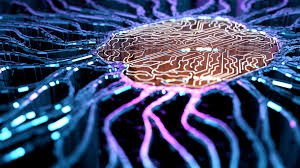Source: news.gsu.edu
ATLANTA—Georgia State University researchers are working to harness deep learning and artificial intelligence to learn more about how mental illness and other disorders affect the brain.
Led by Vince Calhoun, Distinguished University Professor of Psychology at Georgia State and director of the Center for Translational Research in Neuroimaging and Data Science (TReNDS), and Sergey Plis, associate professor of computer science and director of machine learning at TReNDs, the team is combining different types of brain imaging data to capture patterns that are indicative of brain disorders. Robyn Miller, assistant professor of computer science, is a co-investigator on the project. Their work is funded by a $2.4 million, four-year award from the National Institute of Biomedical Imaging and Bioengineering.
“We are working to combine different kinds of imaging data: data that tell us how brain structures look, how the brain is functioning over time or how the brain is connected or wired,” said Calhoun, a Georgia Research Alliance Eminent Scholar in Brain Health & Image Analysis. “The hope is that by transforming this mass of data into a framework, we’ll have a compact way to map brain disorders.”
Advances in brain imaging mean researchers have access to significantly more data than in the past, but the relationships among modalities, or types of data captured, are complex and poorly understood. Calhoun and Plis are focused on characterizing these relationships by merging and analyzing data from multiple sources.
“We’re treating sets of modalities almost like a musical note,” said Calhoun. “We want to take this data and put it in a framework so we can look at how it relates across the modalities. Together, the information could provide a signature, like a chord, that tells us how mental disorders impact the brain.”
They’re also looking at both linear and nonlinear relationships among various modalities.
“Correlation is focused on finding linear relationships. Even if there’s a strong nonlinear relationship, you might not immediately find the connection,” said Calhoun. “That’s where deep learning comes into play, because it’s able to detect more complex relationships, and it’s also good at compressing this massive amount of data into a smaller space.”
Using deep learning, the team will develop and train algorithms on thousands of existing datasets. By examining the data along two spectra, mood and psychosis, they can determine which modalities or brain regions are most relevant to specific disorders. The hope is to develop multi-modal biomarkers that healthcare experts could use for diagnosis of mental health disorders such as schizophrenia, depression or bipolar disorder.
Calhoun recently received two grants related to data sharing and analysis. A $350,000 award from the National Institute of Mental Health will expand an ongoing collaboration with psychology professor Jessica Turner. The existing project is using large-scale imaging analysis to study how symptoms associated with schizophrenia, bipolar disorder and major depression relate to changes in the brain. With the additional funding, Calhoun will analyze how APOE2, a gene that reduces the risk of Alzheimer’s, changes the brain to protect against the neurodegenerative disease. The team will examine brain scans from Alzheimer’s patients using COINSTAC, a software tool built by Calhoun and his group that allows researchers around the world to participate in extensive brain imaging analysis without sharing protected patient data.
A $150,000 award from the National Institute on Drug Abuse will fund a project with Jingyu Liu, associate professor of computer science who leads an imaging genomics lab at TReNDS, to evaluate various ethical and privacy issues associated with large-scale data sharing.
A third project led by Calhoun will look at brain volume patterns associated with COVID-19, and how those patterns relate to clinical disease outcomes. He and his team will examine computerized tomography scans from COVID-19 patients and compare them to scans from individuals who were not infected with SARS-CoV-2. The work is funded by a $150,000 grant from the National Institutes of Health.
